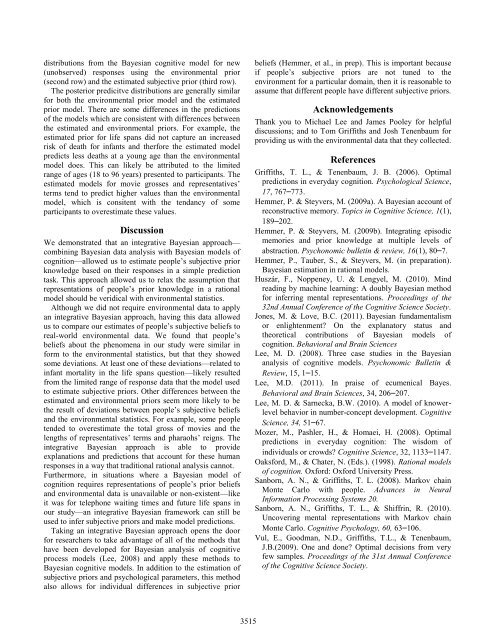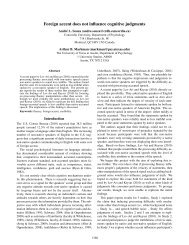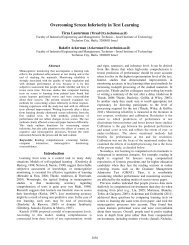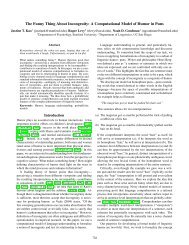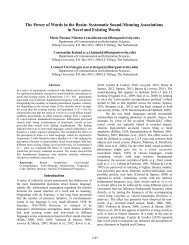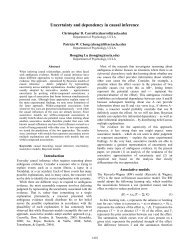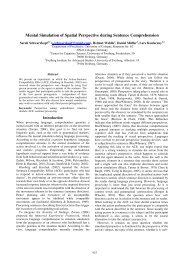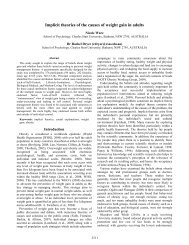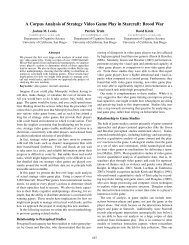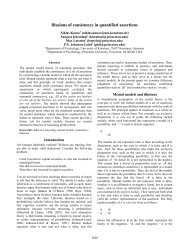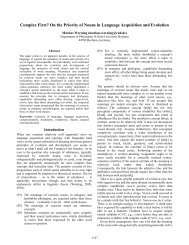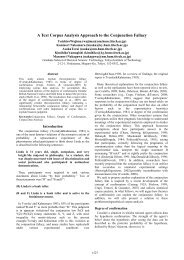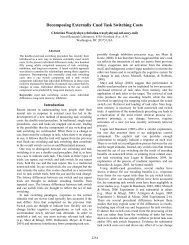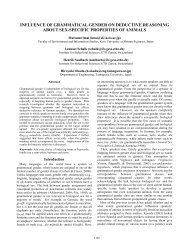Inferring Subjective Prior Knowledge: An ... - MindModeling.org
Inferring Subjective Prior Knowledge: An ... - MindModeling.org
Inferring Subjective Prior Knowledge: An ... - MindModeling.org
You also want an ePaper? Increase the reach of your titles
YUMPU automatically turns print PDFs into web optimized ePapers that Google loves.
distributions from the Bayesian cognitive model for new<br />
(unobserved) responses using the environmental prior<br />
(second row) and the estimated subjective prior (third row).<br />
The posterior predicitve distributions are generally similar<br />
for both the environmental prior model and the estimated<br />
prior model. There are some differences in the predictions<br />
of the models which are consistent with differences between<br />
the estimated and environmental priors. For example, the<br />
estimated prior for life spans did not capture an increased<br />
risk of death for infants and therfore the estimated model<br />
predicts less deaths at a young age than the environmental<br />
model does. This can likely be attributed to the limited<br />
range of ages (18 to 96 years) presented to participants. The<br />
estimated models for movie grosses and representatives’<br />
terms tend to predict higher values than the environmental<br />
model, which is consitent with the tendancy of some<br />
participants to overestimate these values.<br />
Discussion<br />
We demonstrated that an integrative Bayesian approach—<br />
combining Bayesian data analysis with Bayesian models of<br />
cognition—allowed us to estimate people’s subjective prior<br />
knowledge based on their responses in a simple prediction<br />
task. This approach allowed us to relax the assumption that<br />
representations of people’s prior knowledge in a rational<br />
model should be veridical with environmental statistics.<br />
Although we did not require environmental data to apply<br />
an integrative Bayesian approach, having this data allowed<br />
us to compare our estimates of people’s subjective beliefs to<br />
real-world environmental data. We found that people’s<br />
beliefs about the phenomena in our study were similar in<br />
form to the environmental statistics, but that they showed<br />
some deviations. At least one of these deviations—related to<br />
infant mortality in the life spans question—likely resulted<br />
from the limited range of response data that the model used<br />
to estimate subjective priors. Other differences between the<br />
estimated and environmental priors seem more likely to be<br />
the result of deviations between people’s subjective beliefs<br />
and the environmental statistics. For example, some people<br />
tended to overestimate the total gross of movies and the<br />
lengths of representatives’ terms and pharaohs’ reigns. The<br />
integrative Bayesian approach is able to provide<br />
explanations and predictions that account for these human<br />
responses in a way that traditional rational analysis cannot.<br />
Furthermore, in situations where a Bayesian model of<br />
cognition requires representations of people’s prior beliefs<br />
and environmental data is unavailable or non-existent—like<br />
it was for telephone waiting times and future life spans in<br />
our study—an integrative Bayesian framework can still be<br />
used to infer subjective priors and make model predictions.<br />
Taking an integrative Bayesian approach opens the door<br />
for researchers to take advantage of all of the methods that<br />
have been developed for Bayesian analysis of cognitive<br />
process models (Lee, 2008) and apply these methods to<br />
Bayesian cognitive models. In addition to the estimation of<br />
subjective priors and psychological parameters, this method<br />
also allows for individual differences in subjective prior<br />
beliefs (Hemmer, et al., in prep). This is important because<br />
if people’s subjective priors are not tuned to the<br />
environment for a particular domain, then it is reasonable to<br />
assume that different people have different subjective priors.<br />
Acknowledgements<br />
Thank you to Michael Lee and James Pooley for helpful<br />
discussions; and to Tom Griffiths and Josh Tenenbaum for<br />
providing us with the environmental data that they collected.<br />
References<br />
Griffiths, T. L., & Tenenbaum, J. B. (2006). Optimal<br />
predictions in everyday cognition. Psychological Science,<br />
17, 767–773.<br />
Hemmer, P. & Steyvers, M. (2009a). A Bayesian account of<br />
reconstructive memory. Topics in Cognitive Science, 1(1),<br />
189–202.<br />
Hemmer, P. & Steyvers, M. (2009b). Integrating episodic<br />
memories and prior knowledge at multiple levels of<br />
abstraction. Psychonomic bulletin & review, 16(1), 80–7.<br />
Hemmer, P., Tauber, S., & Steyvers, M. (in preparation).<br />
Bayesian estimation in rational models.<br />
Huszár, F., Noppeney, U. & Lengyel, M. (2010). Mind<br />
reading by machine learning: A doubly Bayesian method<br />
for inferring mental representations. Proceedings of the<br />
32nd <strong>An</strong>nual Conference of the Cognitive Science Society.<br />
Jones, M. & Love, B.C. (2011). Bayesian fundamentalism<br />
or enlightenment? On the explanatory status and<br />
theoretical contributions of Bayesian models of<br />
cognition. Behavioral and Brain Sciences<br />
Lee, M. D. (2008). Three case studies in the Bayesian<br />
analysis of cognitive models. Psychonomic Bulletin &<br />
Review, 15, 1–15.<br />
Lee, M.D. (2011). In praise of ecumenical Bayes.<br />
Behavioral and Brain Sciences, 34, 206–207.<br />
Lee, M. D. & Sarnecka, B.W. (2010). A model of knowerlevel<br />
behavior in number-concept development. Cognitive<br />
Science, 34, 51–67.<br />
Mozer, M., Pashler, H., & Homaei, H. (2008). Optimal<br />
predictions in everyday cognition: The wisdom of<br />
individuals or crowds? Cognitive Science, 32, 1133–1147.<br />
Oaksford, M., & Chater, N. (Eds.). (1998). Rational models<br />
of cognition. Oxford: Oxford University Press.<br />
Sanborn, A. N., & Griffiths, T. L. (2008). Markov chain<br />
Monte Carlo with people. Advances in Neural<br />
Information Processing Systems 20.<br />
Sanborn, A. N., Griffiths, T. L., & Shiffrin, R. (2010).<br />
Uncovering mental representations with Markov chain<br />
Monte Carlo. Cognitive Psychology, 60, 63–106.<br />
Vul, E., Goodman, N.D., Griffiths, T.L., & Tenenbaum,<br />
J.B.(2009). One and done? Optimal decisions from very<br />
few samples. Proceedings of the 31st <strong>An</strong>nual Conference<br />
of the Cognitive Science Society.<br />
3515


